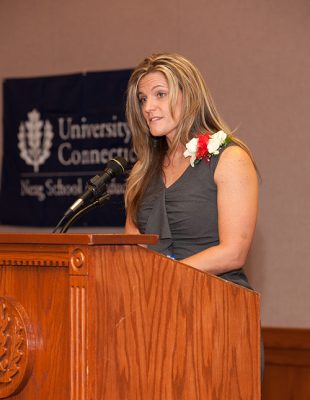Editor’s Note: This Q&A originally appeared on UConn’s Center for Career Development website.

The Center for Career Development was thrilled to connect with Kimberly Ruiz, Neag School alumna and fourth-grade teacher at Dorothy C. Goodwin Elementary School in Mansfield, Conn. Ruiz graduated with her master’s in elementary education in 2000 and currently holds a 092 certificate as well; she was the recipient of the 2012 Outstanding School Educator Award from the Neag School of Education Alumni Society. Utilizing the skills and connections developed through her UConn experience, Ruiz has clearly found her calling in teaching and education.
We asked her several questions regarding her experience and advice she has for current students interested in the field:
- What is the most rewarding aspect of teaching? What is the most challenging aspect of teaching? The most rewarding aspect of teaching is that “a-ha moment” you see on a student’s face when they finally understand something that they have been working so hard at grasping and they experience success for the first time. Seeing students excited about learning and excited about their success, no matter how big or small, is the greatest thing to witness and be a part of. The most challenging part of teaching is finding the time to fit everything you want to teach and impart into a school day, week, month, year. There’s so much to cover and so many fun and innovative ways to do it, there just never seems to be enough time.
“Seeing students excited about learning and excited about their success, no matter how big or how small, is the greatest thing to witness and be a part of.” Kimberly Ruiz ’99 (ED), ’00 MA, fourth-grade teacher
- Please describe your first professional experience. How has it helped you get where you are today? My first professional experience was when I was a Neag student and was working as a student in the schools I was placed in for clinical, student teaching, and interning. The experiences I had with amazing leaders and teachers helped me to understand who I wanted to be as a teacher and teacher leader. It helped me to understand how to work with colleagues, parents, and students. It helped me to see that you can teach and have fun and make meaningful connections with students, parents, and staff members. There’s so much to learn in these placements if you’re willing to dive into the school community and go above and beyond the description of your placement.
- If we visited your classroom, what would we see? An inviting and homey environment that is focused on student-centered learning, student discussions, inquiry-based learning – individually, in partners, and small groups. Students using Chromebooks and Google classroom to discuss, teach, and communicate with each other, and respond to essential questions. You would see me as the facilitator of these things. Anchor charts that reflect mini lessons that they could refer to later on and reference. Flexible seating options are available to suit everyone’s learning styles and an environment that is fun, respectful, and collaborative with opportunities for creative expression.
- How do you manage your time effectively? I have a fabulous teammate (also a Neag alumnus!) and we do as much as we can to share the workload and really hold true to DuFour and DuFour’s principles of Professional Learning Communities. I use my planning time to plan and have a block of time after school allocated for parent and colleague communication. I often answer emails at home and do the best I can to find a good balance of work/home/self. I try to implement systems of management within my classroom that hold my students accountable for some of the things that they are capable of managing that I don’t have to and, therefore, this allows me more time to conference with students and work 1-1 with those who need it. However, let’s face it … everything a teacher must do to be successful with his or her students couldn’t possibly be done within the school day, so teamwork and efficiency are key, along with finding a schedule that works best for you.
- What is the No. 1 piece of advice you have for a student who desires to go into education? My advice is to make sure that you are focused on your passion and find opportunities to become a leader in some way. For me, it’s the students. There are so many aspects of the job that can cloud your focus or keep you busied with other tasks that it can be easy to lose focus at times. In the end for me, it all comes down to the kids. I am constantly asking myself “How will this help my students? Is this something that will impact my students positively if I become involved?” [Whether it is committees, reviews, or extracurricular opportunities]. Sometimes, the answer is simple, and other times, it will benefit my students because it will invigorate me and therefore help me to be better for them. My advice is to remain focused on your passion and find small ways to be a leader.
Are you interested in connecting with more individuals in your field? Stop by the Center for Career Development for guidance regarding networking and how to effectively reach out to professionals like Kimberly Ruiz!
 Facebook
Facebook
 Twitter
Twitter
 LinkedIn
LinkedIn
